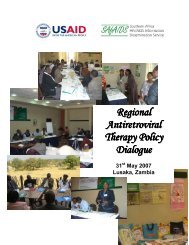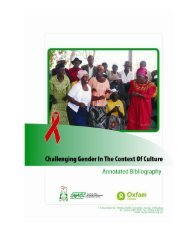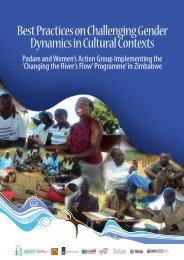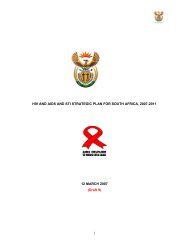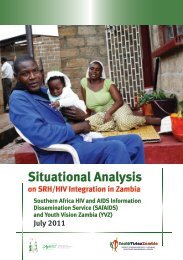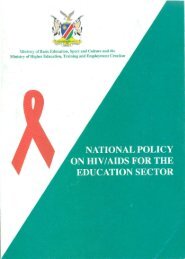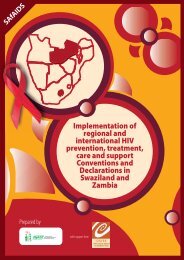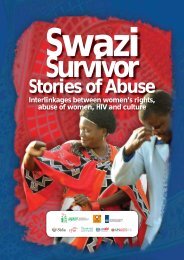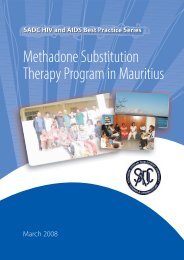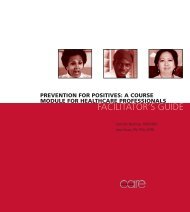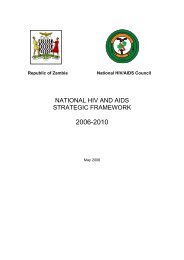Zimbabwean stories of "Best Practice" - SAfAIDS
Zimbabwean stories of "Best Practice" - SAfAIDS
Zimbabwean stories of "Best Practice" - SAfAIDS
Create successful ePaper yourself
Turn your PDF publications into a flip-book with our unique Google optimized e-Paper software.
• TARSC works with implementing partners which makes M&E difficult to achieve since it requires thatnot just TARSC is monitored and evaluated, but also its implementing partners. There are over 25partner implementers, many <strong>of</strong> whom have operations in the rural areas, making their own abilitiesto obtain feedback challenging. TARSC is in the process <strong>of</strong> addressing this challenge and is in theplanning stage <strong>of</strong> developing a more systematic M&E process in cooperation with partners in <strong>Zimbabwean</strong>d the region.• One <strong>of</strong> the reasons for the popularity <strong>of</strong> the Auntie Stella toolkit is its attractive packaging andpresentation. However, this is costly and limits the wide distribution <strong>of</strong> the toolkit. Usually the toolkitis given only to organisations or to community Facilitators and occasionally to peer educators. However,the trade-<strong>of</strong>f <strong>of</strong> the high cost <strong>of</strong> the toolkit is that it encourages its use as it was originally intended;as a training package that involves group discussion and community involvement.• One <strong>of</strong> biggest challenges has been to get youth organisations and youth groups to understand andimplement the Auntie Stella learning cycle, moving from reflecting on a particular story or problemto identifying with it, discussing how it relates to their own lives and then making decisions that willinfluence the way they think or act in the future. Often youth groups “run out <strong>of</strong> time” and leave outthe action points. This is why the Auntie Stella training has increasingly focused on participatoryapproaches to working with youth so as to improve the understanding <strong>of</strong> the Auntie Stella methodology.8.5 Lessons learntThere are a number <strong>of</strong> key lessons that have been learnt by the implementers <strong>of</strong> the Auntie Stella programme:• Introducing gender issues into a culture defined by male dominance can be tricky. It is wise to beginsuch work with organisations that already have structures in place to allow the integration <strong>of</strong> relativelynew ideas. For example, the autonomy given to the teacher education institutions in the country todecide their own curriculum made it relatively simple for Auntie Stella to be used by trainee teachers,especially in partnership with ZIMPATH. When a programme such as Auntie Stella proves successfulin such organisations, other organisations are likely to follow with their support.• A method that seems to encourage the girls to speak out is for them to discuss issues first in an allgirlgroup where they can think through the issues and perhaps, once they see the support <strong>of</strong> othersin the group (and realise they are not alone in their experiences), they gain the courage to speak out.Often if the girls choose a representative to speak for them, that representative would be moreoutspoken than if she was speaking only for herself, as she feels responsible for the well-being <strong>of</strong>those who have trusted her as their representative. When the girls go back into a mixed group, they,or their representative, tend to speak out more confidently than if they had not initially had theopportunity to discuss things on their own.• Auntie Stella has relatively liberal views on issues <strong>of</strong> sexuality and because <strong>of</strong> this certain cards, suchas the one on condom use, may not be accepted by all church leaders. Auntie Stella respects theviews <strong>of</strong> leaders with different opinions by allowing alternative positions on controversial issues tobe presented. The 'Talking Points' sections <strong>of</strong> the cards are relevant here. They allow different voicesto be heard and in the end they encourage the youth to make up their own minds, having had theopportunity to become better informed about the issues. Therefore, the 'Talking Points' are an essentialaspect <strong>of</strong> the cards which ensures sensitivity to context and avoids dogmatism.59



